Promoting Reproduction Planning in Ghana: A Strategic Health Report
VerifiedAdded on 2023/06/03
|27
|6145
|360
Report
AI Summary
This report examines reproductive health planning in Ghana, focusing on strategies to improve adolescent health, prevent early pregnancies, and promote optimal birth spacing. It outlines the Ministry of Health's objectives, including family planning, prevention of reproductive tract infections, and safe motherhood. The report proposes an action plan involving qualitative research, key informant interviews, and data analysis to evaluate the effectiveness of reproductive health programs. Recommendations emphasize gender equality, reproductive health education, and women's rights. The study also addresses ethical considerations and outlines a proposed budget and timeline for implementation. Desklib offers more solved assignments for students.
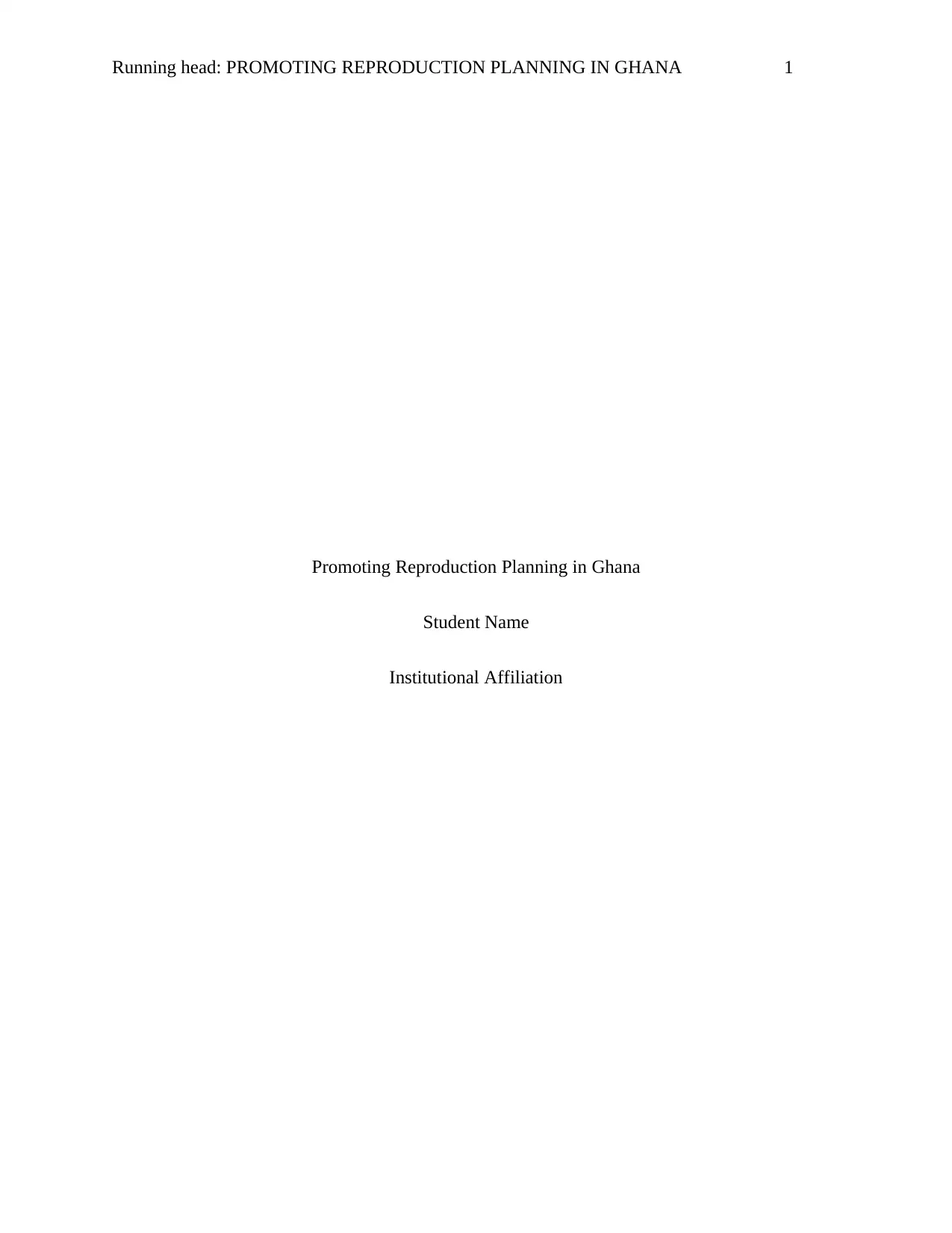
Running head: PROMOTING REPRODUCTION PLANNING IN GHANA 1
Promoting Reproduction Planning in Ghana
Student Name
Institutional Affiliation
Promoting Reproduction Planning in Ghana
Student Name
Institutional Affiliation
Paraphrase This Document
Need a fresh take? Get an instant paraphrase of this document with our AI Paraphraser
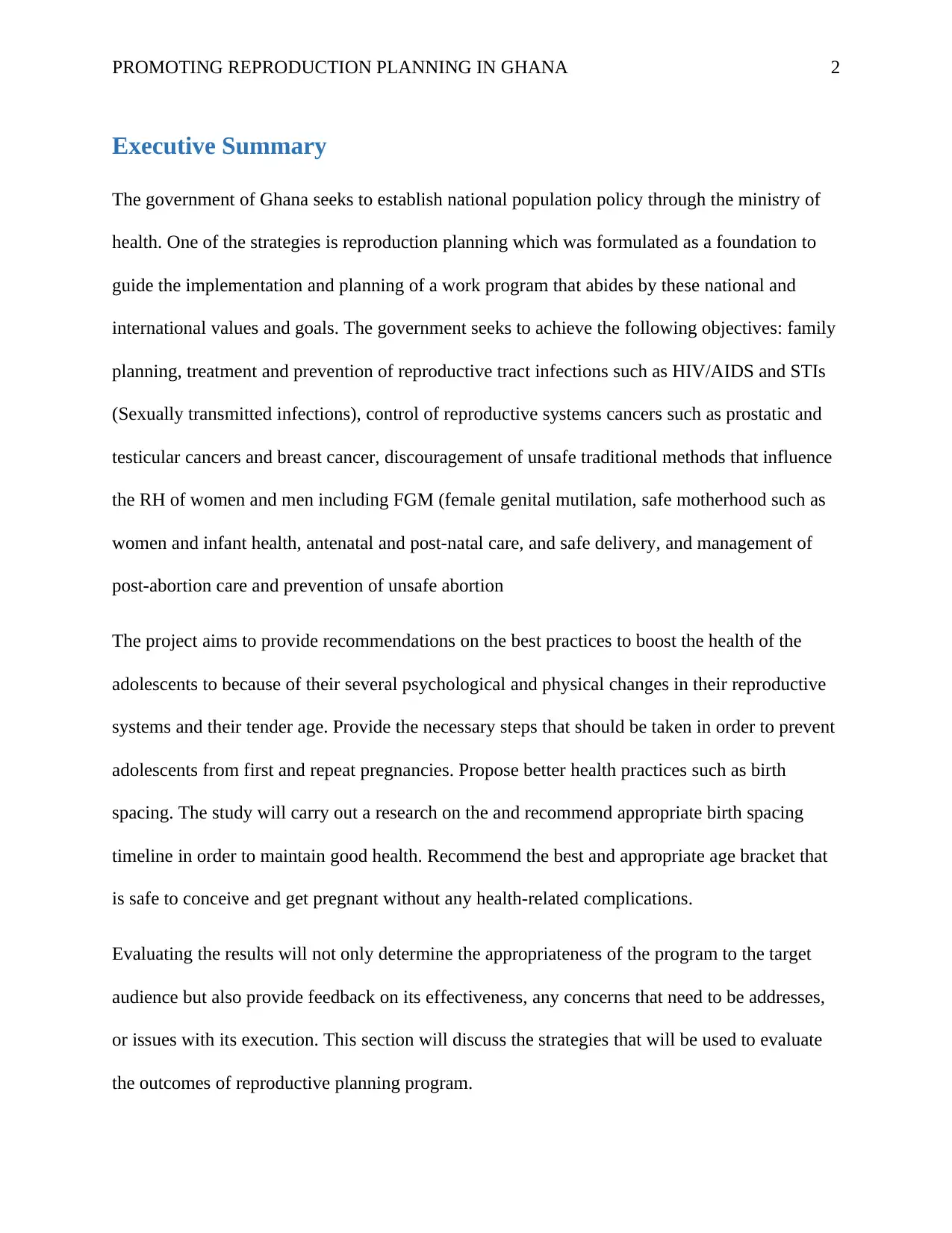
PROMOTING REPRODUCTION PLANNING IN GHANA 2
Executive Summary
The government of Ghana seeks to establish national population policy through the ministry of
health. One of the strategies is reproduction planning which was formulated as a foundation to
guide the implementation and planning of a work program that abides by these national and
international values and goals. The government seeks to achieve the following objectives: family
planning, treatment and prevention of reproductive tract infections such as HIV/AIDS and STIs
(Sexually transmitted infections), control of reproductive systems cancers such as prostatic and
testicular cancers and breast cancer, discouragement of unsafe traditional methods that influence
the RH of women and men including FGM (female genital mutilation, safe motherhood such as
women and infant health, antenatal and post-natal care, and safe delivery, and management of
post-abortion care and prevention of unsafe abortion
The project aims to provide recommendations on the best practices to boost the health of the
adolescents to because of their several psychological and physical changes in their reproductive
systems and their tender age. Provide the necessary steps that should be taken in order to prevent
adolescents from first and repeat pregnancies. Propose better health practices such as birth
spacing. The study will carry out a research on the and recommend appropriate birth spacing
timeline in order to maintain good health. Recommend the best and appropriate age bracket that
is safe to conceive and get pregnant without any health-related complications.
Evaluating the results will not only determine the appropriateness of the program to the target
audience but also provide feedback on its effectiveness, any concerns that need to be addresses,
or issues with its execution. This section will discuss the strategies that will be used to evaluate
the outcomes of reproductive planning program.
Executive Summary
The government of Ghana seeks to establish national population policy through the ministry of
health. One of the strategies is reproduction planning which was formulated as a foundation to
guide the implementation and planning of a work program that abides by these national and
international values and goals. The government seeks to achieve the following objectives: family
planning, treatment and prevention of reproductive tract infections such as HIV/AIDS and STIs
(Sexually transmitted infections), control of reproductive systems cancers such as prostatic and
testicular cancers and breast cancer, discouragement of unsafe traditional methods that influence
the RH of women and men including FGM (female genital mutilation, safe motherhood such as
women and infant health, antenatal and post-natal care, and safe delivery, and management of
post-abortion care and prevention of unsafe abortion
The project aims to provide recommendations on the best practices to boost the health of the
adolescents to because of their several psychological and physical changes in their reproductive
systems and their tender age. Provide the necessary steps that should be taken in order to prevent
adolescents from first and repeat pregnancies. Propose better health practices such as birth
spacing. The study will carry out a research on the and recommend appropriate birth spacing
timeline in order to maintain good health. Recommend the best and appropriate age bracket that
is safe to conceive and get pregnant without any health-related complications.
Evaluating the results will not only determine the appropriateness of the program to the target
audience but also provide feedback on its effectiveness, any concerns that need to be addresses,
or issues with its execution. This section will discuss the strategies that will be used to evaluate
the outcomes of reproductive planning program.
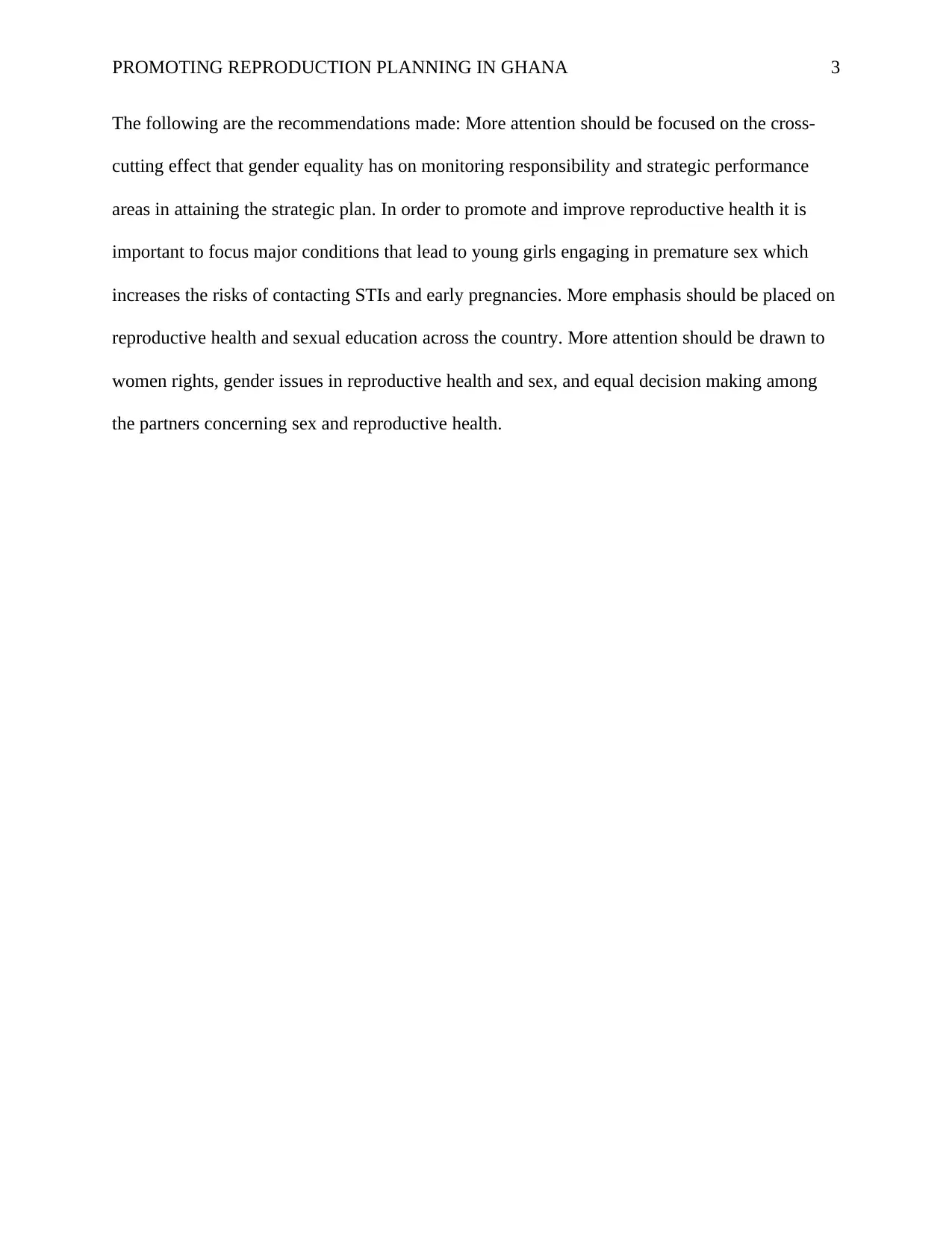
PROMOTING REPRODUCTION PLANNING IN GHANA 3
The following are the recommendations made: More attention should be focused on the cross-
cutting effect that gender equality has on monitoring responsibility and strategic performance
areas in attaining the strategic plan. In order to promote and improve reproductive health it is
important to focus major conditions that lead to young girls engaging in premature sex which
increases the risks of contacting STIs and early pregnancies. More emphasis should be placed on
reproductive health and sexual education across the country. More attention should be drawn to
women rights, gender issues in reproductive health and sex, and equal decision making among
the partners concerning sex and reproductive health.
The following are the recommendations made: More attention should be focused on the cross-
cutting effect that gender equality has on monitoring responsibility and strategic performance
areas in attaining the strategic plan. In order to promote and improve reproductive health it is
important to focus major conditions that lead to young girls engaging in premature sex which
increases the risks of contacting STIs and early pregnancies. More emphasis should be placed on
reproductive health and sexual education across the country. More attention should be drawn to
women rights, gender issues in reproductive health and sex, and equal decision making among
the partners concerning sex and reproductive health.
⊘ This is a preview!⊘
Do you want full access?
Subscribe today to unlock all pages.

Trusted by 1+ million students worldwide
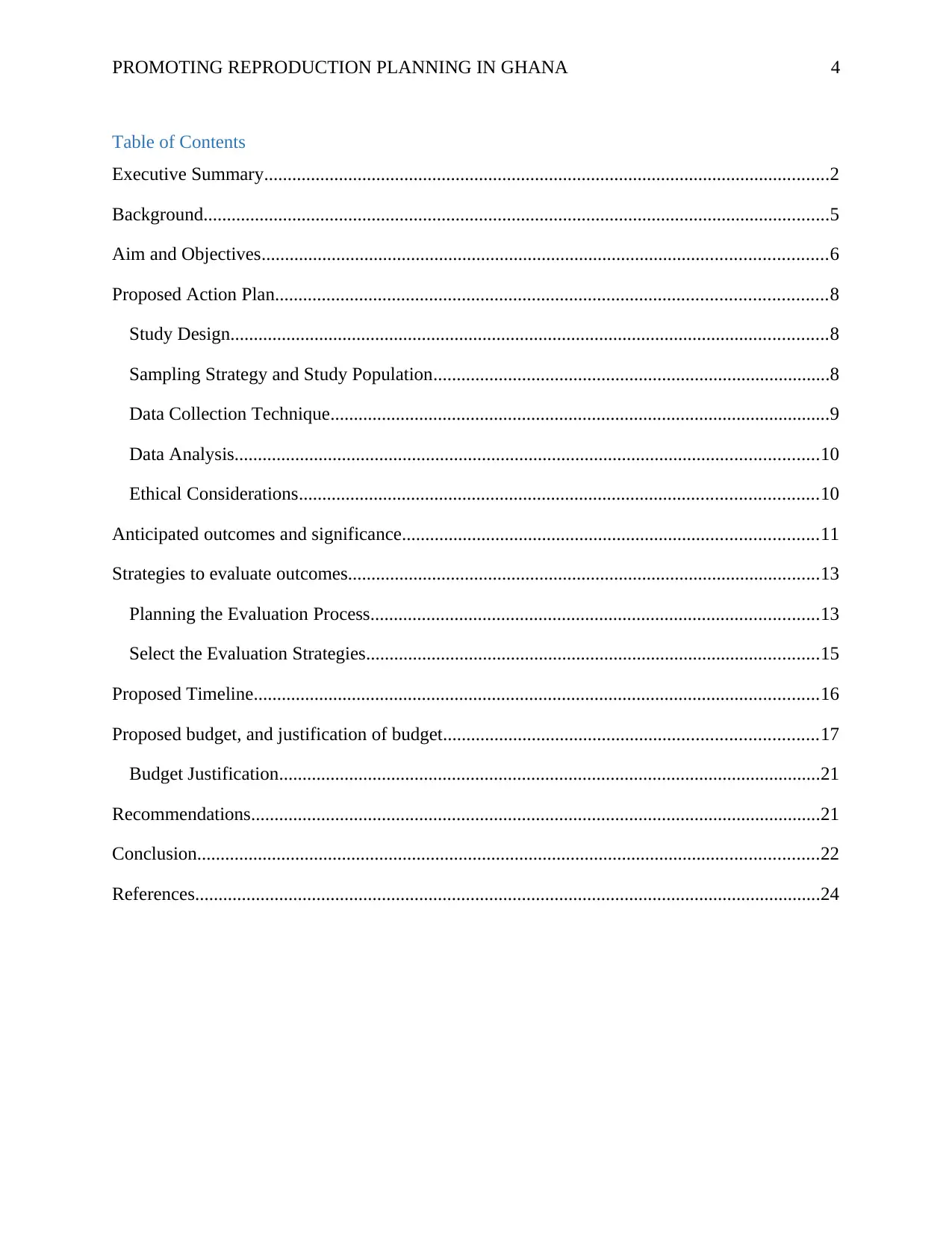
PROMOTING REPRODUCTION PLANNING IN GHANA 4
Table of Contents
Executive Summary.........................................................................................................................2
Background......................................................................................................................................5
Aim and Objectives.........................................................................................................................6
Proposed Action Plan......................................................................................................................8
Study Design................................................................................................................................8
Sampling Strategy and Study Population.....................................................................................8
Data Collection Technique...........................................................................................................9
Data Analysis.............................................................................................................................10
Ethical Considerations...............................................................................................................10
Anticipated outcomes and significance.........................................................................................11
Strategies to evaluate outcomes.....................................................................................................13
Planning the Evaluation Process................................................................................................13
Select the Evaluation Strategies.................................................................................................15
Proposed Timeline.........................................................................................................................16
Proposed budget, and justification of budget................................................................................17
Budget Justification....................................................................................................................21
Recommendations..........................................................................................................................21
Conclusion.....................................................................................................................................22
References......................................................................................................................................24
Table of Contents
Executive Summary.........................................................................................................................2
Background......................................................................................................................................5
Aim and Objectives.........................................................................................................................6
Proposed Action Plan......................................................................................................................8
Study Design................................................................................................................................8
Sampling Strategy and Study Population.....................................................................................8
Data Collection Technique...........................................................................................................9
Data Analysis.............................................................................................................................10
Ethical Considerations...............................................................................................................10
Anticipated outcomes and significance.........................................................................................11
Strategies to evaluate outcomes.....................................................................................................13
Planning the Evaluation Process................................................................................................13
Select the Evaluation Strategies.................................................................................................15
Proposed Timeline.........................................................................................................................16
Proposed budget, and justification of budget................................................................................17
Budget Justification....................................................................................................................21
Recommendations..........................................................................................................................21
Conclusion.....................................................................................................................................22
References......................................................................................................................................24
Paraphrase This Document
Need a fresh take? Get an instant paraphrase of this document with our AI Paraphraser
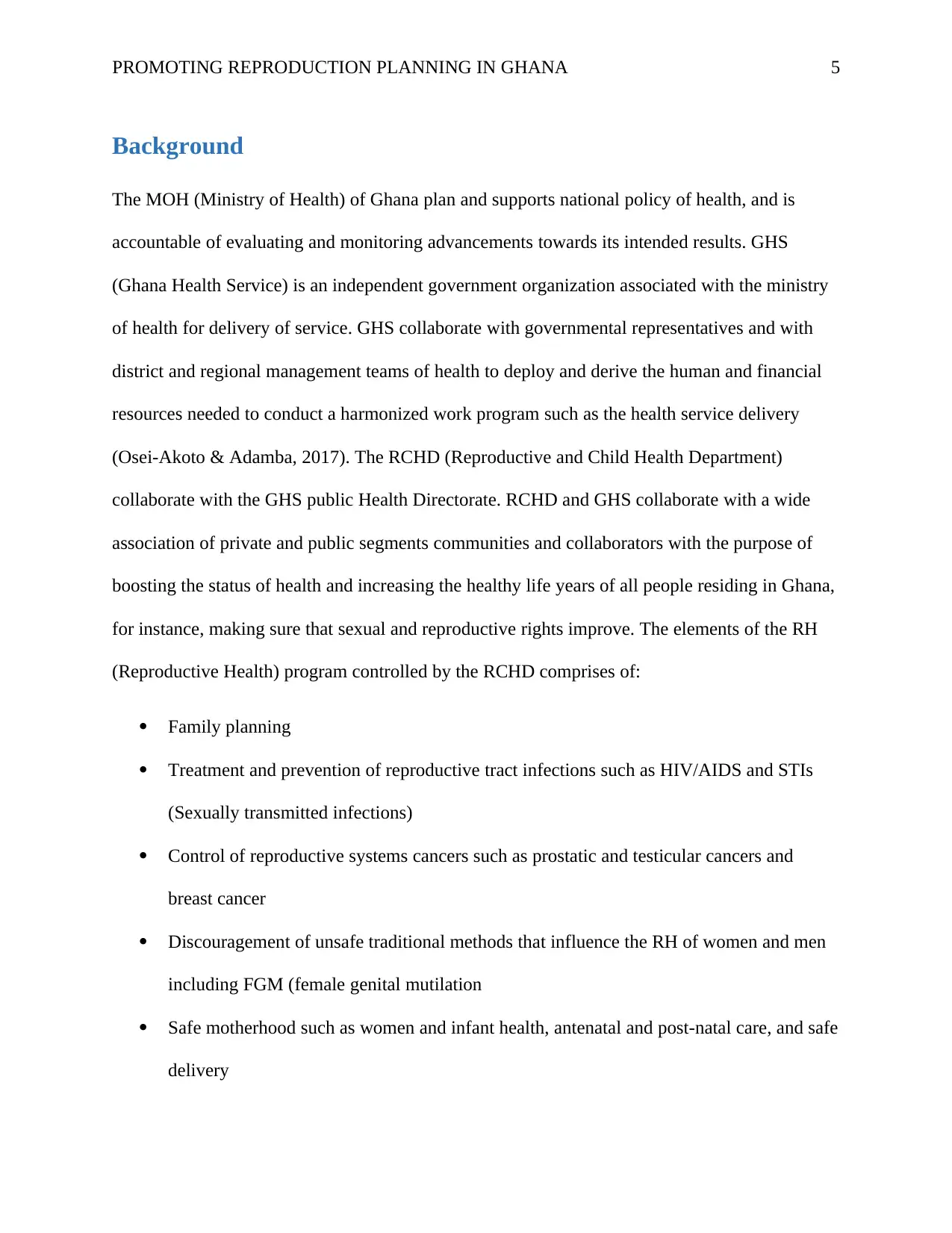
PROMOTING REPRODUCTION PLANNING IN GHANA 5
Background
The MOH (Ministry of Health) of Ghana plan and supports national policy of health, and is
accountable of evaluating and monitoring advancements towards its intended results. GHS
(Ghana Health Service) is an independent government organization associated with the ministry
of health for delivery of service. GHS collaborate with governmental representatives and with
district and regional management teams of health to deploy and derive the human and financial
resources needed to conduct a harmonized work program such as the health service delivery
(Osei-Akoto & Adamba, 2017). The RCHD (Reproductive and Child Health Department)
collaborate with the GHS public Health Directorate. RCHD and GHS collaborate with a wide
association of private and public segments communities and collaborators with the purpose of
boosting the status of health and increasing the healthy life years of all people residing in Ghana,
for instance, making sure that sexual and reproductive rights improve. The elements of the RH
(Reproductive Health) program controlled by the RCHD comprises of:
Family planning
Treatment and prevention of reproductive tract infections such as HIV/AIDS and STIs
(Sexually transmitted infections)
Control of reproductive systems cancers such as prostatic and testicular cancers and
breast cancer
Discouragement of unsafe traditional methods that influence the RH of women and men
including FGM (female genital mutilation
Safe motherhood such as women and infant health, antenatal and post-natal care, and safe
delivery
Background
The MOH (Ministry of Health) of Ghana plan and supports national policy of health, and is
accountable of evaluating and monitoring advancements towards its intended results. GHS
(Ghana Health Service) is an independent government organization associated with the ministry
of health for delivery of service. GHS collaborate with governmental representatives and with
district and regional management teams of health to deploy and derive the human and financial
resources needed to conduct a harmonized work program such as the health service delivery
(Osei-Akoto & Adamba, 2017). The RCHD (Reproductive and Child Health Department)
collaborate with the GHS public Health Directorate. RCHD and GHS collaborate with a wide
association of private and public segments communities and collaborators with the purpose of
boosting the status of health and increasing the healthy life years of all people residing in Ghana,
for instance, making sure that sexual and reproductive rights improve. The elements of the RH
(Reproductive Health) program controlled by the RCHD comprises of:
Family planning
Treatment and prevention of reproductive tract infections such as HIV/AIDS and STIs
(Sexually transmitted infections)
Control of reproductive systems cancers such as prostatic and testicular cancers and
breast cancer
Discouragement of unsafe traditional methods that influence the RH of women and men
including FGM (female genital mutilation
Safe motherhood such as women and infant health, antenatal and post-natal care, and safe
delivery
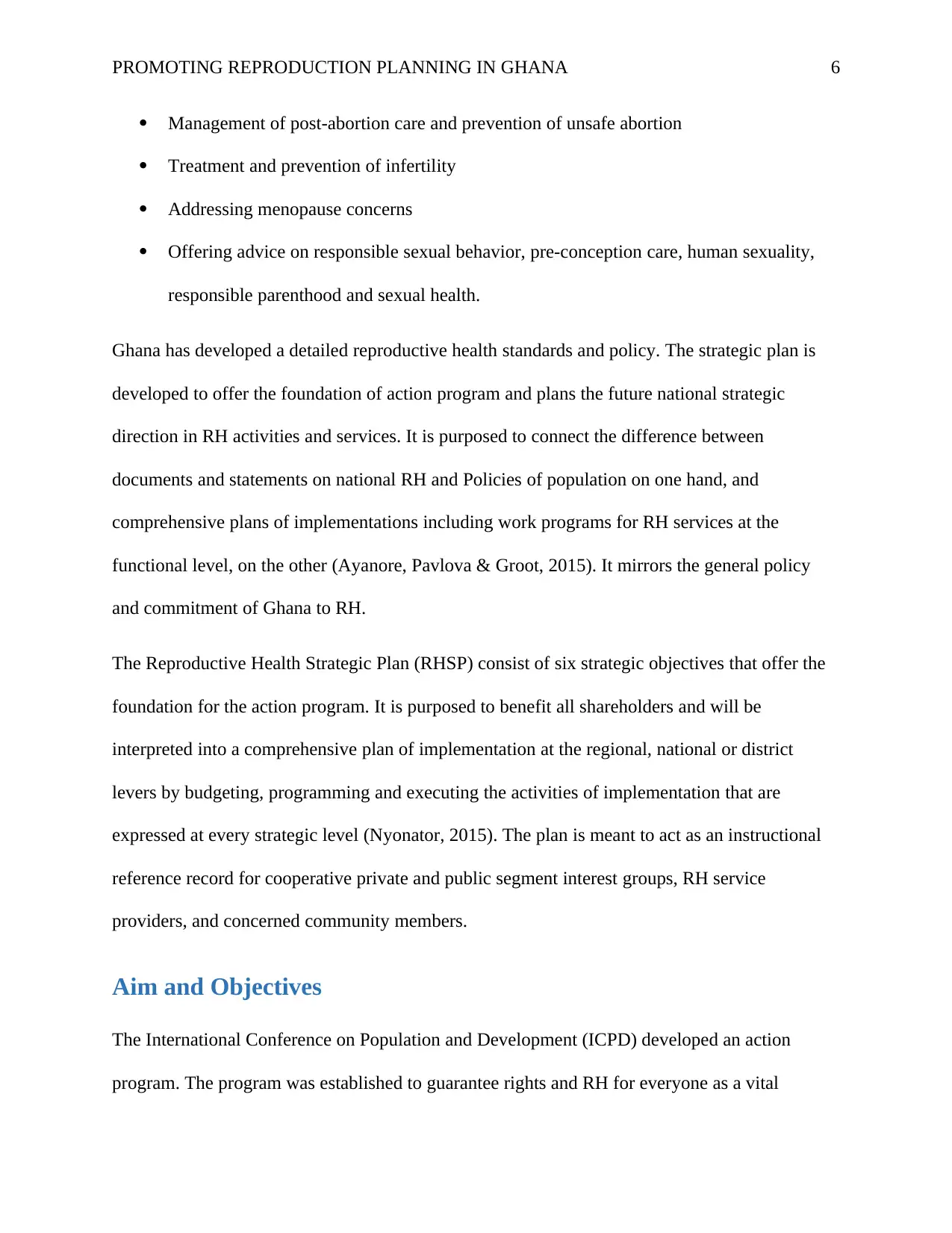
PROMOTING REPRODUCTION PLANNING IN GHANA 6
Management of post-abortion care and prevention of unsafe abortion
Treatment and prevention of infertility
Addressing menopause concerns
Offering advice on responsible sexual behavior, pre-conception care, human sexuality,
responsible parenthood and sexual health.
Ghana has developed a detailed reproductive health standards and policy. The strategic plan is
developed to offer the foundation of action program and plans the future national strategic
direction in RH activities and services. It is purposed to connect the difference between
documents and statements on national RH and Policies of population on one hand, and
comprehensive plans of implementations including work programs for RH services at the
functional level, on the other (Ayanore, Pavlova & Groot, 2015). It mirrors the general policy
and commitment of Ghana to RH.
The Reproductive Health Strategic Plan (RHSP) consist of six strategic objectives that offer the
foundation for the action program. It is purposed to benefit all shareholders and will be
interpreted into a comprehensive plan of implementation at the regional, national or district
levers by budgeting, programming and executing the activities of implementation that are
expressed at every strategic level (Nyonator, 2015). The plan is meant to act as an instructional
reference record for cooperative private and public segment interest groups, RH service
providers, and concerned community members.
Aim and Objectives
The International Conference on Population and Development (ICPD) developed an action
program. The program was established to guarantee rights and RH for everyone as a vital
Management of post-abortion care and prevention of unsafe abortion
Treatment and prevention of infertility
Addressing menopause concerns
Offering advice on responsible sexual behavior, pre-conception care, human sexuality,
responsible parenthood and sexual health.
Ghana has developed a detailed reproductive health standards and policy. The strategic plan is
developed to offer the foundation of action program and plans the future national strategic
direction in RH activities and services. It is purposed to connect the difference between
documents and statements on national RH and Policies of population on one hand, and
comprehensive plans of implementations including work programs for RH services at the
functional level, on the other (Ayanore, Pavlova & Groot, 2015). It mirrors the general policy
and commitment of Ghana to RH.
The Reproductive Health Strategic Plan (RHSP) consist of six strategic objectives that offer the
foundation for the action program. It is purposed to benefit all shareholders and will be
interpreted into a comprehensive plan of implementation at the regional, national or district
levers by budgeting, programming and executing the activities of implementation that are
expressed at every strategic level (Nyonator, 2015). The plan is meant to act as an instructional
reference record for cooperative private and public segment interest groups, RH service
providers, and concerned community members.
Aim and Objectives
The International Conference on Population and Development (ICPD) developed an action
program. The program was established to guarantee rights and RH for everyone as a vital
⊘ This is a preview!⊘
Do you want full access?
Subscribe today to unlock all pages.

Trusted by 1+ million students worldwide
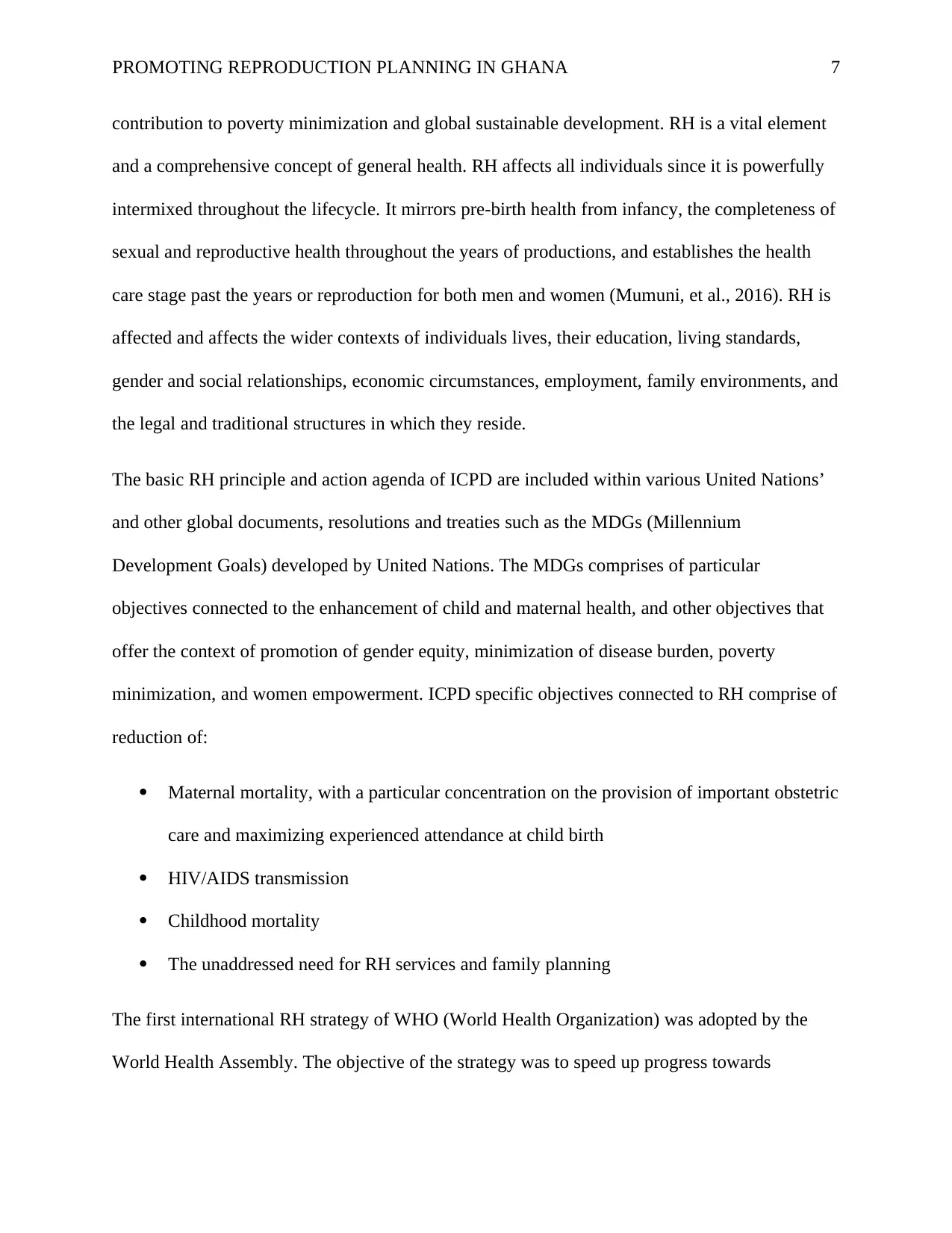
PROMOTING REPRODUCTION PLANNING IN GHANA 7
contribution to poverty minimization and global sustainable development. RH is a vital element
and a comprehensive concept of general health. RH affects all individuals since it is powerfully
intermixed throughout the lifecycle. It mirrors pre-birth health from infancy, the completeness of
sexual and reproductive health throughout the years of productions, and establishes the health
care stage past the years or reproduction for both men and women (Mumuni, et al., 2016). RH is
affected and affects the wider contexts of individuals lives, their education, living standards,
gender and social relationships, economic circumstances, employment, family environments, and
the legal and traditional structures in which they reside.
The basic RH principle and action agenda of ICPD are included within various United Nations’
and other global documents, resolutions and treaties such as the MDGs (Millennium
Development Goals) developed by United Nations. The MDGs comprises of particular
objectives connected to the enhancement of child and maternal health, and other objectives that
offer the context of promotion of gender equity, minimization of disease burden, poverty
minimization, and women empowerment. ICPD specific objectives connected to RH comprise of
reduction of:
Maternal mortality, with a particular concentration on the provision of important obstetric
care and maximizing experienced attendance at child birth
HIV/AIDS transmission
Childhood mortality
The unaddressed need for RH services and family planning
The first international RH strategy of WHO (World Health Organization) was adopted by the
World Health Assembly. The objective of the strategy was to speed up progress towards
contribution to poverty minimization and global sustainable development. RH is a vital element
and a comprehensive concept of general health. RH affects all individuals since it is powerfully
intermixed throughout the lifecycle. It mirrors pre-birth health from infancy, the completeness of
sexual and reproductive health throughout the years of productions, and establishes the health
care stage past the years or reproduction for both men and women (Mumuni, et al., 2016). RH is
affected and affects the wider contexts of individuals lives, their education, living standards,
gender and social relationships, economic circumstances, employment, family environments, and
the legal and traditional structures in which they reside.
The basic RH principle and action agenda of ICPD are included within various United Nations’
and other global documents, resolutions and treaties such as the MDGs (Millennium
Development Goals) developed by United Nations. The MDGs comprises of particular
objectives connected to the enhancement of child and maternal health, and other objectives that
offer the context of promotion of gender equity, minimization of disease burden, poverty
minimization, and women empowerment. ICPD specific objectives connected to RH comprise of
reduction of:
Maternal mortality, with a particular concentration on the provision of important obstetric
care and maximizing experienced attendance at child birth
HIV/AIDS transmission
Childhood mortality
The unaddressed need for RH services and family planning
The first international RH strategy of WHO (World Health Organization) was adopted by the
World Health Assembly. The objective of the strategy was to speed up progress towards
Paraphrase This Document
Need a fresh take? Get an instant paraphrase of this document with our AI Paraphraser
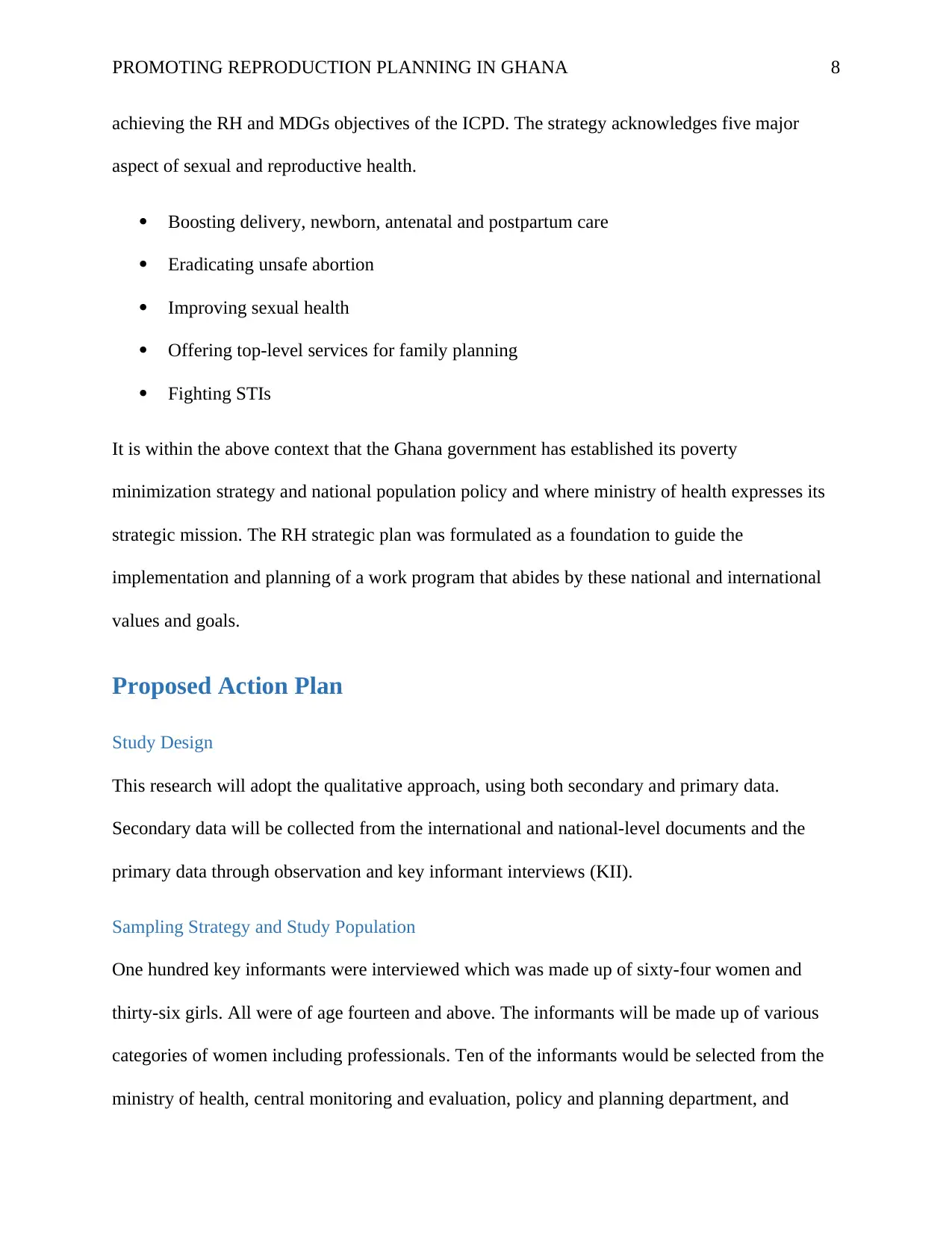
PROMOTING REPRODUCTION PLANNING IN GHANA 8
achieving the RH and MDGs objectives of the ICPD. The strategy acknowledges five major
aspect of sexual and reproductive health.
Boosting delivery, newborn, antenatal and postpartum care
Eradicating unsafe abortion
Improving sexual health
Offering top-level services for family planning
Fighting STIs
It is within the above context that the Ghana government has established its poverty
minimization strategy and national population policy and where ministry of health expresses its
strategic mission. The RH strategic plan was formulated as a foundation to guide the
implementation and planning of a work program that abides by these national and international
values and goals.
Proposed Action Plan
Study Design
This research will adopt the qualitative approach, using both secondary and primary data.
Secondary data will be collected from the international and national-level documents and the
primary data through observation and key informant interviews (KII).
Sampling Strategy and Study Population
One hundred key informants were interviewed which was made up of sixty-four women and
thirty-six girls. All were of age fourteen and above. The informants will be made up of various
categories of women including professionals. Ten of the informants would be selected from the
ministry of health, central monitoring and evaluation, policy and planning department, and
achieving the RH and MDGs objectives of the ICPD. The strategy acknowledges five major
aspect of sexual and reproductive health.
Boosting delivery, newborn, antenatal and postpartum care
Eradicating unsafe abortion
Improving sexual health
Offering top-level services for family planning
Fighting STIs
It is within the above context that the Ghana government has established its poverty
minimization strategy and national population policy and where ministry of health expresses its
strategic mission. The RH strategic plan was formulated as a foundation to guide the
implementation and planning of a work program that abides by these national and international
values and goals.
Proposed Action Plan
Study Design
This research will adopt the qualitative approach, using both secondary and primary data.
Secondary data will be collected from the international and national-level documents and the
primary data through observation and key informant interviews (KII).
Sampling Strategy and Study Population
One hundred key informants were interviewed which was made up of sixty-four women and
thirty-six girls. All were of age fourteen and above. The informants will be made up of various
categories of women including professionals. Ten of the informants would be selected from the
ministry of health, central monitoring and evaluation, policy and planning department, and
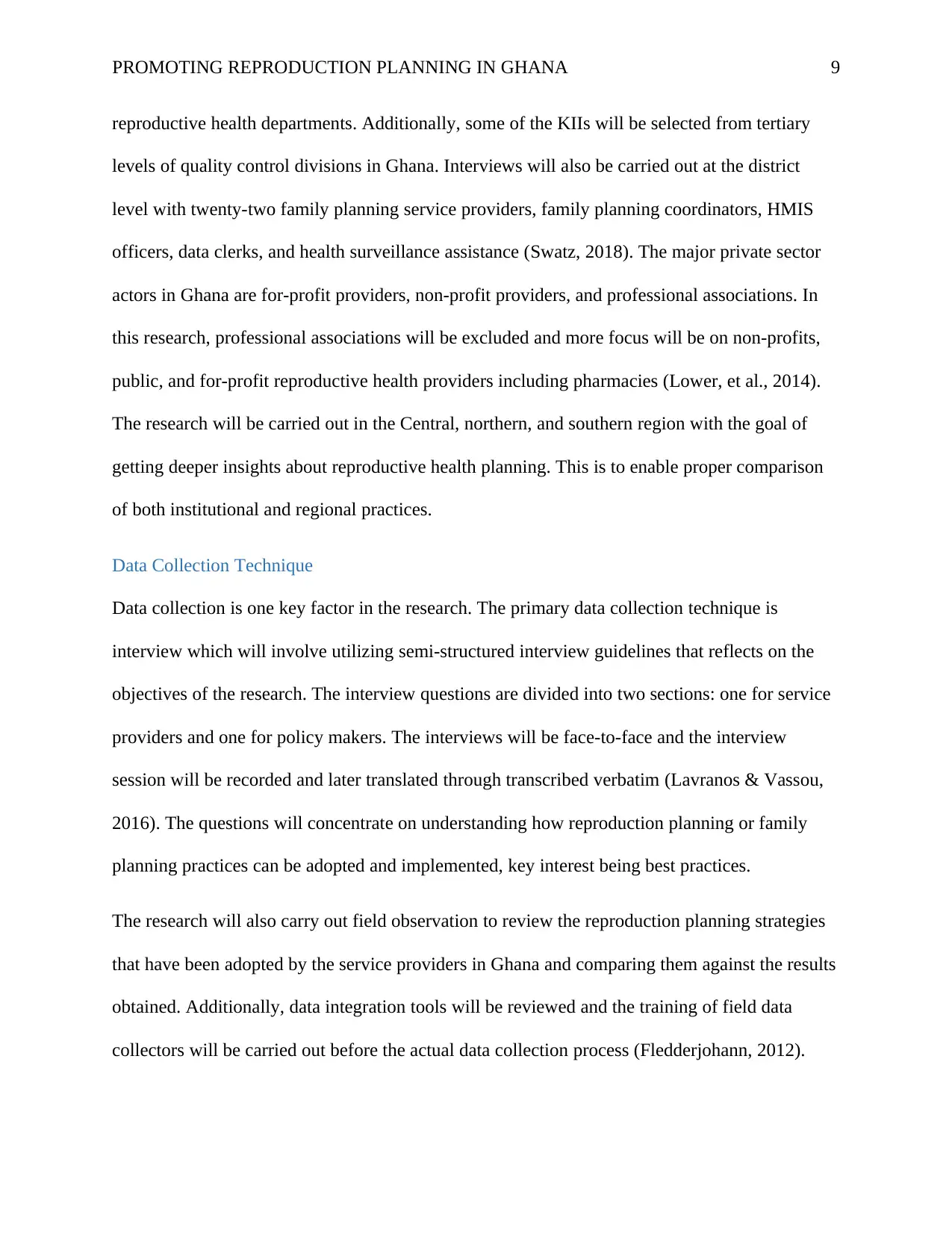
PROMOTING REPRODUCTION PLANNING IN GHANA 9
reproductive health departments. Additionally, some of the KIIs will be selected from tertiary
levels of quality control divisions in Ghana. Interviews will also be carried out at the district
level with twenty-two family planning service providers, family planning coordinators, HMIS
officers, data clerks, and health surveillance assistance (Swatz, 2018). The major private sector
actors in Ghana are for-profit providers, non-profit providers, and professional associations. In
this research, professional associations will be excluded and more focus will be on non-profits,
public, and for-profit reproductive health providers including pharmacies (Lower, et al., 2014).
The research will be carried out in the Central, northern, and southern region with the goal of
getting deeper insights about reproductive health planning. This is to enable proper comparison
of both institutional and regional practices.
Data Collection Technique
Data collection is one key factor in the research. The primary data collection technique is
interview which will involve utilizing semi-structured interview guidelines that reflects on the
objectives of the research. The interview questions are divided into two sections: one for service
providers and one for policy makers. The interviews will be face-to-face and the interview
session will be recorded and later translated through transcribed verbatim (Lavranos & Vassou,
2016). The questions will concentrate on understanding how reproduction planning or family
planning practices can be adopted and implemented, key interest being best practices.
The research will also carry out field observation to review the reproduction planning strategies
that have been adopted by the service providers in Ghana and comparing them against the results
obtained. Additionally, data integration tools will be reviewed and the training of field data
collectors will be carried out before the actual data collection process (Fledderjohann, 2012).
reproductive health departments. Additionally, some of the KIIs will be selected from tertiary
levels of quality control divisions in Ghana. Interviews will also be carried out at the district
level with twenty-two family planning service providers, family planning coordinators, HMIS
officers, data clerks, and health surveillance assistance (Swatz, 2018). The major private sector
actors in Ghana are for-profit providers, non-profit providers, and professional associations. In
this research, professional associations will be excluded and more focus will be on non-profits,
public, and for-profit reproductive health providers including pharmacies (Lower, et al., 2014).
The research will be carried out in the Central, northern, and southern region with the goal of
getting deeper insights about reproductive health planning. This is to enable proper comparison
of both institutional and regional practices.
Data Collection Technique
Data collection is one key factor in the research. The primary data collection technique is
interview which will involve utilizing semi-structured interview guidelines that reflects on the
objectives of the research. The interview questions are divided into two sections: one for service
providers and one for policy makers. The interviews will be face-to-face and the interview
session will be recorded and later translated through transcribed verbatim (Lavranos & Vassou,
2016). The questions will concentrate on understanding how reproduction planning or family
planning practices can be adopted and implemented, key interest being best practices.
The research will also carry out field observation to review the reproduction planning strategies
that have been adopted by the service providers in Ghana and comparing them against the results
obtained. Additionally, data integration tools will be reviewed and the training of field data
collectors will be carried out before the actual data collection process (Fledderjohann, 2012).
⊘ This is a preview!⊘
Do you want full access?
Subscribe today to unlock all pages.

Trusted by 1+ million students worldwide
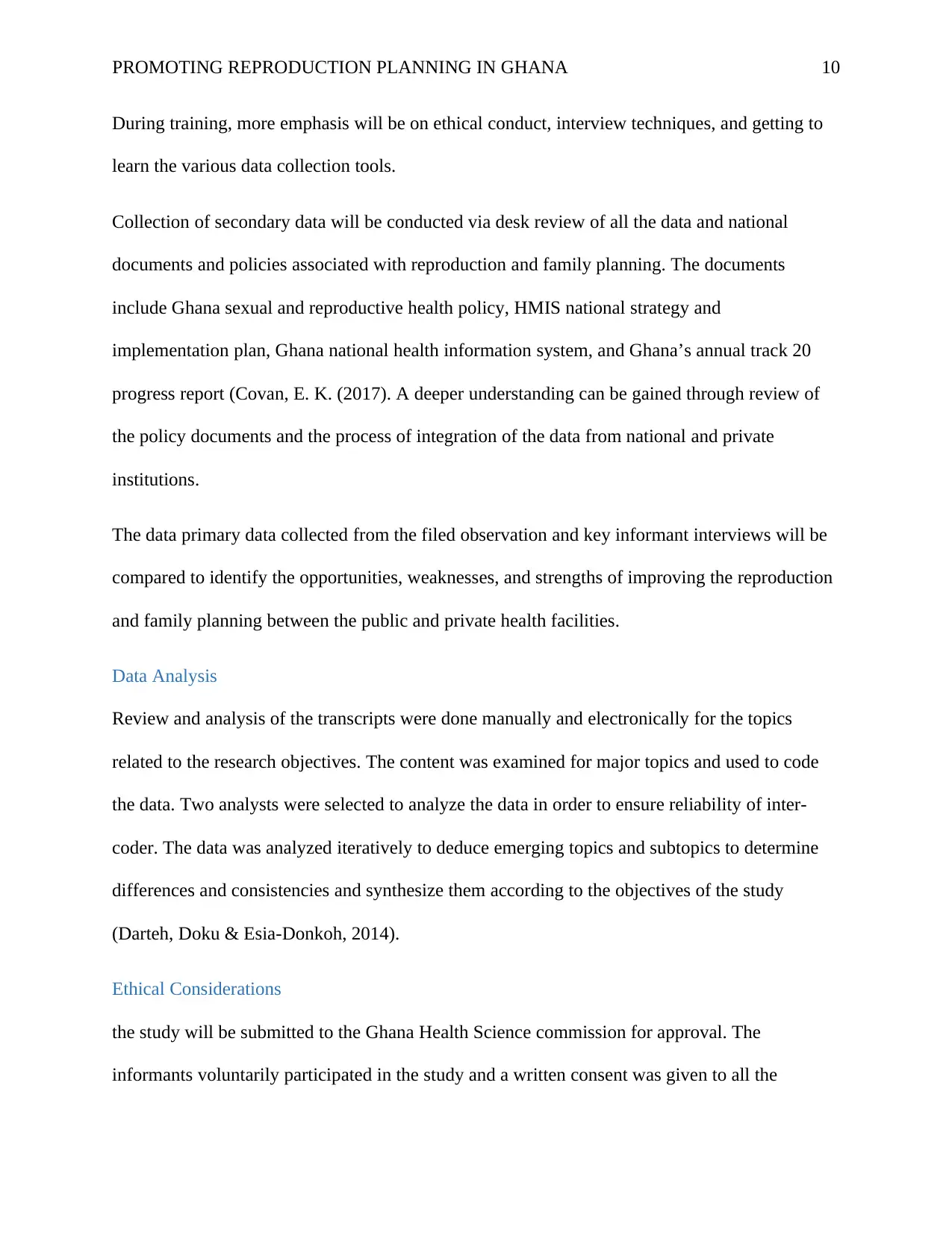
PROMOTING REPRODUCTION PLANNING IN GHANA 10
During training, more emphasis will be on ethical conduct, interview techniques, and getting to
learn the various data collection tools.
Collection of secondary data will be conducted via desk review of all the data and national
documents and policies associated with reproduction and family planning. The documents
include Ghana sexual and reproductive health policy, HMIS national strategy and
implementation plan, Ghana national health information system, and Ghana’s annual track 20
progress report (Covan, E. K. (2017). A deeper understanding can be gained through review of
the policy documents and the process of integration of the data from national and private
institutions.
The data primary data collected from the filed observation and key informant interviews will be
compared to identify the opportunities, weaknesses, and strengths of improving the reproduction
and family planning between the public and private health facilities.
Data Analysis
Review and analysis of the transcripts were done manually and electronically for the topics
related to the research objectives. The content was examined for major topics and used to code
the data. Two analysts were selected to analyze the data in order to ensure reliability of inter-
coder. The data was analyzed iteratively to deduce emerging topics and subtopics to determine
differences and consistencies and synthesize them according to the objectives of the study
(Darteh, Doku & Esia-Donkoh, 2014).
Ethical Considerations
the study will be submitted to the Ghana Health Science commission for approval. The
informants voluntarily participated in the study and a written consent was given to all the
During training, more emphasis will be on ethical conduct, interview techniques, and getting to
learn the various data collection tools.
Collection of secondary data will be conducted via desk review of all the data and national
documents and policies associated with reproduction and family planning. The documents
include Ghana sexual and reproductive health policy, HMIS national strategy and
implementation plan, Ghana national health information system, and Ghana’s annual track 20
progress report (Covan, E. K. (2017). A deeper understanding can be gained through review of
the policy documents and the process of integration of the data from national and private
institutions.
The data primary data collected from the filed observation and key informant interviews will be
compared to identify the opportunities, weaknesses, and strengths of improving the reproduction
and family planning between the public and private health facilities.
Data Analysis
Review and analysis of the transcripts were done manually and electronically for the topics
related to the research objectives. The content was examined for major topics and used to code
the data. Two analysts were selected to analyze the data in order to ensure reliability of inter-
coder. The data was analyzed iteratively to deduce emerging topics and subtopics to determine
differences and consistencies and synthesize them according to the objectives of the study
(Darteh, Doku & Esia-Donkoh, 2014).
Ethical Considerations
the study will be submitted to the Ghana Health Science commission for approval. The
informants voluntarily participated in the study and a written consent was given to all the
Paraphrase This Document
Need a fresh take? Get an instant paraphrase of this document with our AI Paraphraser
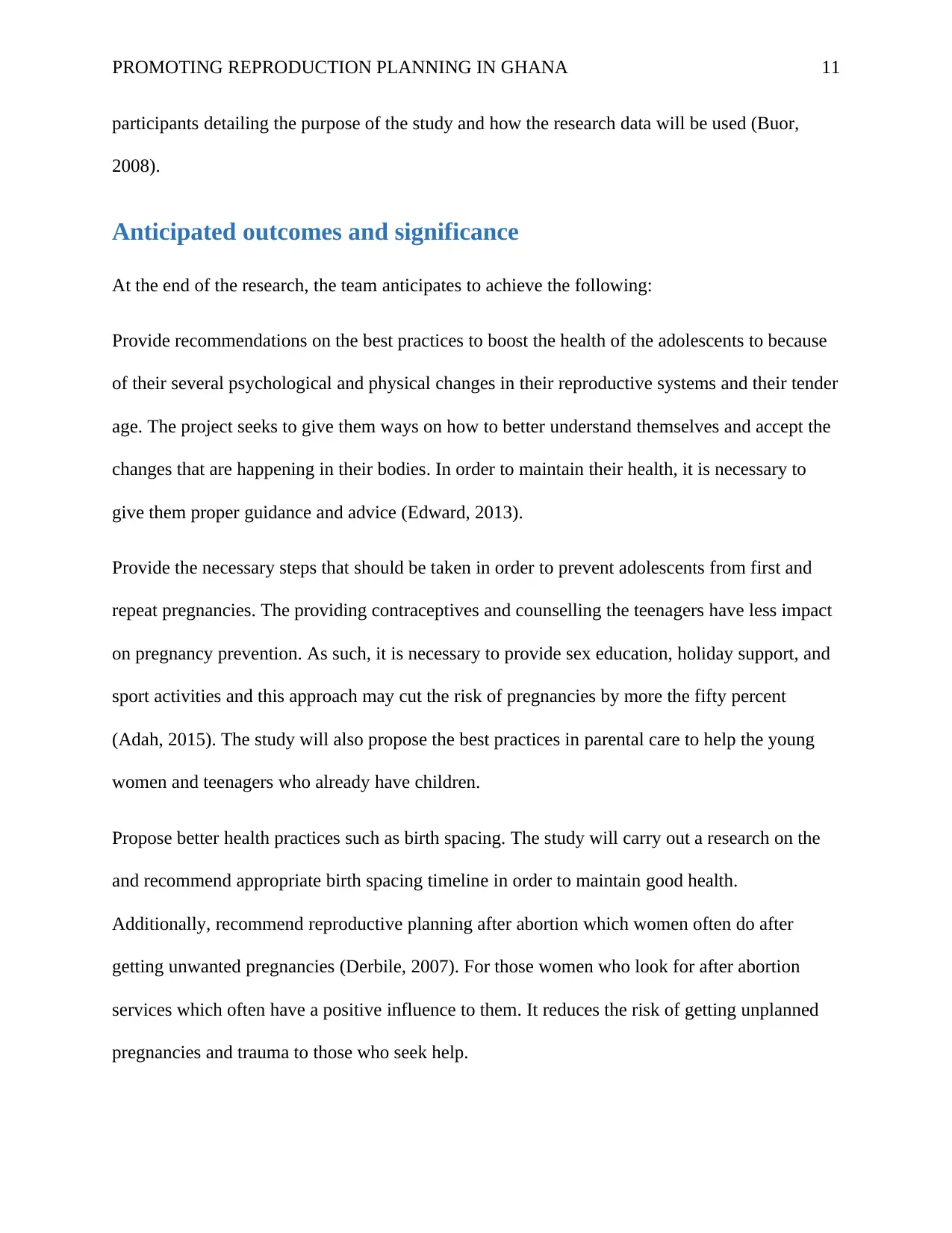
PROMOTING REPRODUCTION PLANNING IN GHANA 11
participants detailing the purpose of the study and how the research data will be used (Buor,
2008).
Anticipated outcomes and significance
At the end of the research, the team anticipates to achieve the following:
Provide recommendations on the best practices to boost the health of the adolescents to because
of their several psychological and physical changes in their reproductive systems and their tender
age. The project seeks to give them ways on how to better understand themselves and accept the
changes that are happening in their bodies. In order to maintain their health, it is necessary to
give them proper guidance and advice (Edward, 2013).
Provide the necessary steps that should be taken in order to prevent adolescents from first and
repeat pregnancies. The providing contraceptives and counselling the teenagers have less impact
on pregnancy prevention. As such, it is necessary to provide sex education, holiday support, and
sport activities and this approach may cut the risk of pregnancies by more the fifty percent
(Adah, 2015). The study will also propose the best practices in parental care to help the young
women and teenagers who already have children.
Propose better health practices such as birth spacing. The study will carry out a research on the
and recommend appropriate birth spacing timeline in order to maintain good health.
Additionally, recommend reproductive planning after abortion which women often do after
getting unwanted pregnancies (Derbile, 2007). For those women who look for after abortion
services which often have a positive influence to them. It reduces the risk of getting unplanned
pregnancies and trauma to those who seek help.
participants detailing the purpose of the study and how the research data will be used (Buor,
2008).
Anticipated outcomes and significance
At the end of the research, the team anticipates to achieve the following:
Provide recommendations on the best practices to boost the health of the adolescents to because
of their several psychological and physical changes in their reproductive systems and their tender
age. The project seeks to give them ways on how to better understand themselves and accept the
changes that are happening in their bodies. In order to maintain their health, it is necessary to
give them proper guidance and advice (Edward, 2013).
Provide the necessary steps that should be taken in order to prevent adolescents from first and
repeat pregnancies. The providing contraceptives and counselling the teenagers have less impact
on pregnancy prevention. As such, it is necessary to provide sex education, holiday support, and
sport activities and this approach may cut the risk of pregnancies by more the fifty percent
(Adah, 2015). The study will also propose the best practices in parental care to help the young
women and teenagers who already have children.
Propose better health practices such as birth spacing. The study will carry out a research on the
and recommend appropriate birth spacing timeline in order to maintain good health.
Additionally, recommend reproductive planning after abortion which women often do after
getting unwanted pregnancies (Derbile, 2007). For those women who look for after abortion
services which often have a positive influence to them. It reduces the risk of getting unplanned
pregnancies and trauma to those who seek help.
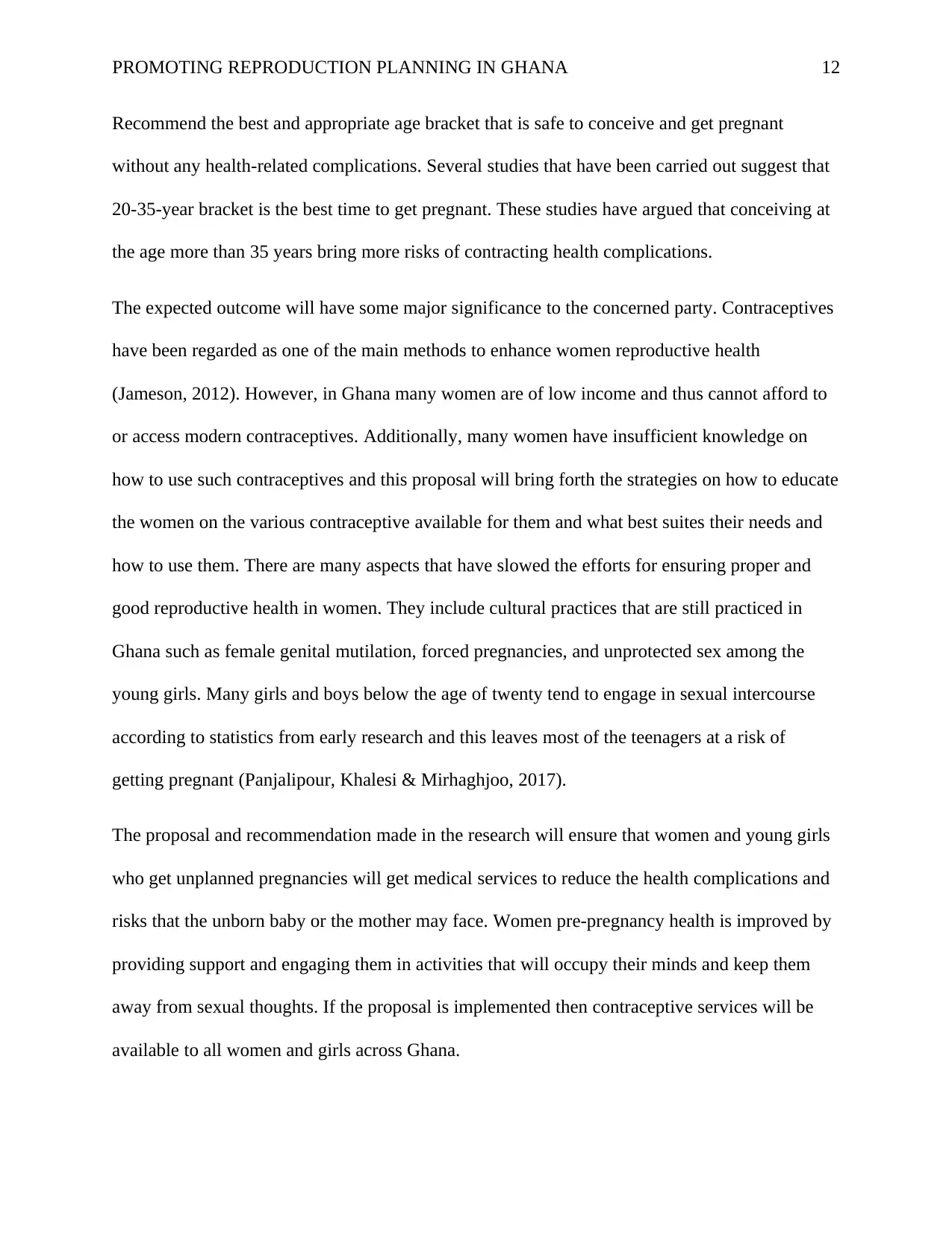
PROMOTING REPRODUCTION PLANNING IN GHANA 12
Recommend the best and appropriate age bracket that is safe to conceive and get pregnant
without any health-related complications. Several studies that have been carried out suggest that
20-35-year bracket is the best time to get pregnant. These studies have argued that conceiving at
the age more than 35 years bring more risks of contracting health complications.
The expected outcome will have some major significance to the concerned party. Contraceptives
have been regarded as one of the main methods to enhance women reproductive health
(Jameson, 2012). However, in Ghana many women are of low income and thus cannot afford to
or access modern contraceptives. Additionally, many women have insufficient knowledge on
how to use such contraceptives and this proposal will bring forth the strategies on how to educate
the women on the various contraceptive available for them and what best suites their needs and
how to use them. There are many aspects that have slowed the efforts for ensuring proper and
good reproductive health in women. They include cultural practices that are still practiced in
Ghana such as female genital mutilation, forced pregnancies, and unprotected sex among the
young girls. Many girls and boys below the age of twenty tend to engage in sexual intercourse
according to statistics from early research and this leaves most of the teenagers at a risk of
getting pregnant (Panjalipour, Khalesi & Mirhaghjoo, 2017).
The proposal and recommendation made in the research will ensure that women and young girls
who get unplanned pregnancies will get medical services to reduce the health complications and
risks that the unborn baby or the mother may face. Women pre-pregnancy health is improved by
providing support and engaging them in activities that will occupy their minds and keep them
away from sexual thoughts. If the proposal is implemented then contraceptive services will be
available to all women and girls across Ghana.
Recommend the best and appropriate age bracket that is safe to conceive and get pregnant
without any health-related complications. Several studies that have been carried out suggest that
20-35-year bracket is the best time to get pregnant. These studies have argued that conceiving at
the age more than 35 years bring more risks of contracting health complications.
The expected outcome will have some major significance to the concerned party. Contraceptives
have been regarded as one of the main methods to enhance women reproductive health
(Jameson, 2012). However, in Ghana many women are of low income and thus cannot afford to
or access modern contraceptives. Additionally, many women have insufficient knowledge on
how to use such contraceptives and this proposal will bring forth the strategies on how to educate
the women on the various contraceptive available for them and what best suites their needs and
how to use them. There are many aspects that have slowed the efforts for ensuring proper and
good reproductive health in women. They include cultural practices that are still practiced in
Ghana such as female genital mutilation, forced pregnancies, and unprotected sex among the
young girls. Many girls and boys below the age of twenty tend to engage in sexual intercourse
according to statistics from early research and this leaves most of the teenagers at a risk of
getting pregnant (Panjalipour, Khalesi & Mirhaghjoo, 2017).
The proposal and recommendation made in the research will ensure that women and young girls
who get unplanned pregnancies will get medical services to reduce the health complications and
risks that the unborn baby or the mother may face. Women pre-pregnancy health is improved by
providing support and engaging them in activities that will occupy their minds and keep them
away from sexual thoughts. If the proposal is implemented then contraceptive services will be
available to all women and girls across Ghana.
⊘ This is a preview!⊘
Do you want full access?
Subscribe today to unlock all pages.

Trusted by 1+ million students worldwide
1 out of 27
Related Documents
Your All-in-One AI-Powered Toolkit for Academic Success.
+13062052269
info@desklib.com
Available 24*7 on WhatsApp / Email
![[object Object]](/_next/static/media/star-bottom.7253800d.svg)
Unlock your academic potential
Copyright © 2020–2025 A2Z Services. All Rights Reserved. Developed and managed by ZUCOL.





